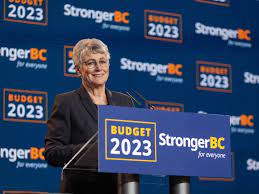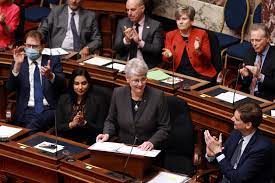DESIBUZZCanada
Events Listings
Dummy Post

International Day Of Yoga To Be Virtually Celebrated Saturday At 4pm

CANCELLED: Coronavirus Fears Kills Surrey’s Vaisakhi Day Parade

ADVERTISE WITH US: DESIBUZZCanada Is The Most Read South Asian Publication Online

SURREY LIBRARIES: Get Technology Help At Surrey Libraries

WALLY OPPAL: Surrey Police Transition Update On Feb. 26

GONE ARE THE DAYS - Feature Documentary Trailer

Technology Help At Surrey Libraries

Birding Walks

Plea Poetry/short Story : Youth Contest

International Folk Dancing Drop-in Sessions
BUDGET 2023: BC Government Targeting Housing, Mental Health And Inflation In New Budget
- March 5, 2023

BC government is targeting housing, mental health and inflation in Budget 2023 as it invests in improving health and mental-health care, creating more affordable housing, growing a clean economy and delivering more help with costs - especially for families and British Columbians most affected by global inflation. "B.C. is a great place to live, but people are facing real challenges - not only from global inflation and the pandemic, but from ongoing and systemic challenges," said Katrine Conroy, Minister of Finance. "This year's budget helps protect people who can't afford today's high prices and takes action on the issues people care about, like finding affordable housing and accessing health care."
By DESIBUZZCanada Staff
VICTORIA – BC government is targeting housing, mental health and inflation in Budget 2023 as it invests in improving health and mental-health care, creating more affordable housing, growing a clean economy and delivering more help with costs - especially for families and British Columbians most affected by global inflation.
"B.C. is a great place to live, but people are facing real challenges - not only from global inflation and the pandemic, but from ongoing and systemic challenges," said Katrine Conroy, Minister of Finance. "This year's budget helps protect people who can't afford today's high prices and takes action on the issues people care about, like finding affordable housing and accessing health care."
Almost $6.4 billion in new investments over three years will strengthen public health care and help people find and stay connected to the care they need. This includes funding to significantly improve cancer care, build up B.C.'s health-care workforce with new training seats, and create better supports for health-care workers and family doctors. This also includes $1 billion in new funding to expand mental-health and addictions services.
Budget 2023 takes more action to get people into homes they can afford, providing an additional $4.2 billion in operating and capital funding over three years - the largest three-year housing investment in B.C. history - for more homes for people who rent, Indigenous people and middle-income families, along with new actions to tackle homelessness.

B.C. is also helping to ensure safe communities by boosting funding by $462 million over the fiscal plan for policing, enforcement, intervention services and access to justice throughout the province.
As global inflation and higher prices stretch people's budgets, Budget 2023 helps reduce people's costs and offers extra support to those who need it most. Following almost $2.4 billion worth of temporary cost-of-living supports since summer 2022, the Province will invest another $4.5 billion over the next three years in new spending measures and tax credits to help people with the effects of rising costs and establish stable, sustainable support.
Approximately $1.3 billion in new investments over three years will help support reduced costs for people. This includes giving free prescription contraception for B.C. residents, expanding existing K-12 school food programs, and providing more financial supports for post-secondary students, people receiving income and disability assistance, and foster families and other caregivers.
Moderate- and low-income renters in B.C. will be eligible for as much as $400 a year through a new income-tested renter's tax credit starting in 2024. The credit will help more than 80% of renter households.
Approximately 75% of families with children are eligible for the BC Family Benefit. Starting in July 2023, these families will see a 10% increase in their monthly payments. Single parents will receive as much as an additional $500 per year on top of the 10% increase, also to be delivered in July.
The Climate Action Tax Credit will be expanded to help people with low and moderate incomes offset the carbon tax, which increases in April 2023 to meet federal requirements as part of B.C.'s transition to a low-carbon future. A significant majority of people are projected to receive more through the enhanced credit than they pay in increased carbon tax by 2030. Payments are higher for people with lower incomes. Prior to the increase, a four-person family could receive a maximum of $500 a year. Starting July 2023, the same family could receive a maximum of $900.

The government is also projecting a budget deficit in the current budget. It said Budget 2023's three-year fiscal plan presents declining deficits, with a projected $4.2-billion deficit in 2023-24, declining to $3 billion in 2025-26.
BC Federation of Labour welcomed the provincial budget, saying it means working people will get some much-needed help to deal with rising costs, and continues to make investments in the public services British Columbians rely on.
“Finance Minister Conroy’s budget makes it clear this government continues to put people first: reducing costs for families, making significant investments in mental health services, and building needed housing and infrastructure,” said BCFED President Sussanne Skidmore.
“The investments the David Eby government is making to expand the services we all rely on are critical to the health of workers, their families and communities. These continued investments are undoing years of damage done by the BC Liberals – and they're finally turning the tide to ensure our public services are there when British Columbians need them,” she added. “And they underline why it’s so important we never go back to the days of deep cuts and neglect.”












